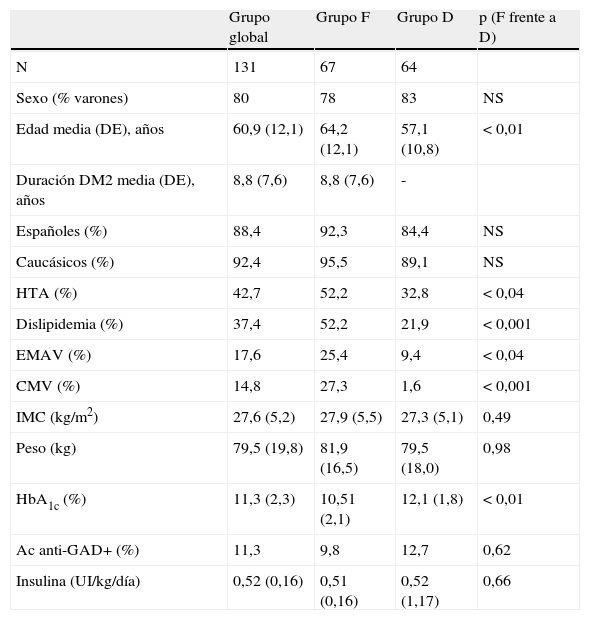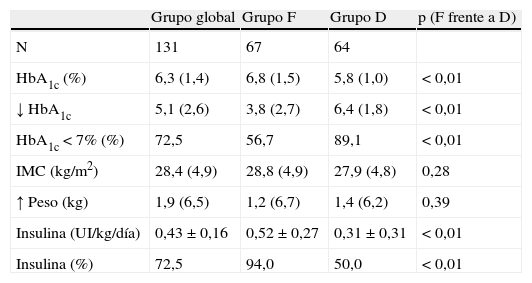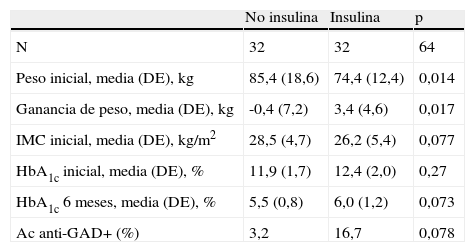El perfil de paciente con diabetes mellitus tipo 2 (DM2) que requiere insulinoterapia es muy variable. Asimismo, los resultados de dicha intervención y el tratamiento del paciente a corto/medio plazo también lo son. Evaluamos los resultados a medio plazo de un programa ambulatorio de insulinización con más de una inyección al día en términos de control metabólico y según el perfil de paciente.
Pacientes y métodoSe analizaron prospectivamente 131 pacientes con DM2, no tratados previamente con insulina, en los que se indicó tratamiento con≥2 inyecciones de insulina/día, iniciando un programa ambulatorio de insulinización específico en régimen de Hospital de Día durante 6 meses.
ResultadosLa hemoglobina glucosilada (HbA1c) inicial media (DE) fue de 11,3 (2,3) % y disminuyó hasta un 6,3 (1,4) % a los 6 meses, con una cifra<7% en un 72,5% de ellos. El grupo de pacientes de reciente diagnóstico (<3 meses, hiperglucemia franca grupo D) era más joven (media de 57,1 [8,10] frente a 64,2 [1,12] años; p<0,01) y tenía una HbA1c inicial superior (media de 12,1 [1,8] frente a 10,5 [2,5] %; p<0,001) que los pacientes incluidos en el programa por fracaso de antidiabéticos orales (grupo F). Al finalizar el programa, un 50% de los pacientes del grupo-D no precisaba insulina, siendo esta cifra del 6,3% en el grupo-F (p<0,001). No existían diferencias significativas en la HbA1c final según el tipo de tratamiento realizado al finalizar el estudio.
ConclusionesLa insulinización de pacientes con DM2 con más de una administración de insulina diaria en régimen ambulatorio consigue y mantiene un buen control metabólico a medio plazo en diferentes perfiles de pacientes. En aquellos sintomáticos y de reciente diagnóstico, hasta en la mitad de los casos la insulina puede retirarse a medio plazo.
The profile of the patient with type 2 diabetes mellitus (DM2) who requires insulin therapy is very diverse as are the results of this intervention and short/middle-term patient management. We evaluated the midterm results of an outpatient program starting insulin therapy with≥2 insulin injections/day in terms of metabolic control in different groups of patients.
Patients and methodWe analyzed prospectively 131 patients with DM2, without previous insulin treatment, who were prescribed treatment with≥2 insulin injections/day and who were enrolled in a specific ambulatory program in order to start insulin therapy in a Day Hospital for 6 months.
ResultsThe initial glycosylated hemoglobin (HbA1c) was 11.3 (2.3) % and decreased to 6.3 (1.4) % in 6 months, with HbA1c<7% in 72.5% of them. The group of recently diagnosed patients (<3 months, symptomatic severe hyperglycemia, D-group) were younger (57.1 [10.8] vs 64.2 [12.1] years; P<.01) and had a higher starting HbA1c (12.1 [1.8] vs 10.5 [2.5] %; P<.001) than patients included in the program for oral antidiabetic drugs’ failure (F-group). At the end of the program 50% of D-group patients did not need insulin (6.3% on F-group [P<.001]). There were no significant differences in either of 2 groups at study ends according to the final treatment scheme.
ConclusionsCounselling patients with DM2 to start insulin with more than one injection per day in Day Hospital setting achieves and maintains a good metabolic control in the medium term in different patient profiles. Among symptomatic and recently diagnosed patients, insulin therapy can be stopped in 50% of them at the medium term.
Artículo
Comprando el artículo el PDF del mismo podrá ser descargado
Precio 19,34 €
Comprar ahora









